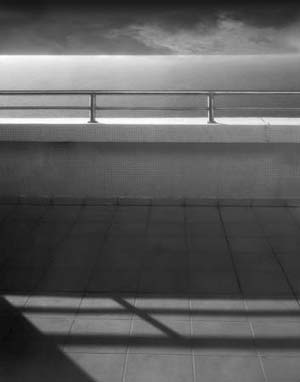
|
THE SHADOW
 ?
A shadow on the ground. ?
A shadow on the ground.
Look at the shadow. Itself without substance, ephemeral, yet the shadow reveals the existence of something somewhere else. The shadow on the ground reveals two realities - the ground, the here-and-now, the physical, the concrete; and the shadow, which reveals something beyond the here-and-now, beyond the physical. Nothing is as insubstantial as a shadow, and yet the shadow reveals the silhouette of something that is beyond. The essence of a sukka is its shade. A sukka that has more sun than shadow is invalid. Our Sages teach that when we sit in the sukka, we are sitting in the "shadow of faith." The spiritual masters derived this phrase from a verse in Shir HaShirim (2:4): "In his shadow, I delighted, and there i sat, and the fruit of his Torah was sweet to my palate." Faith is like a shadow. Faith is the knowledge of something you cannot see. We can know there is a God, but we cannot see him. We can perceive the shadow of his existence, but we cannot see the Reality itself directly. We can experience closeness to God through tasting "the fruit of his Torah." We can experience the sweetness of that Existence that is beyond, but, for the very reason that he is beyond, we can never see that Existence. When Moshe asked God to show him a revelation of that Existence, God replied, "You cannot see My face, for man cannot see Me and live" (Shemot 33:20). A sukka is invalid if it has more sun than shadow because someone sitting in such a sukka is sitting, not in the shade of faith but rather in the glare of the sun. In its essence, the sun does not allow for the existence of the shadow. Its unblinking eye leaves no place for it. The nations of the world are compared to the sun. The sun says, "if you cannot see it, it doesn't exist. If it is not revealed, it isn't there." "Existence is bound by the revealed world," they say. God relates to his creatures measure for measure. In the future, the nations of the world will complain to God that he did not give them the mitzvot that the Jewish people received. God will give them an easy mitzva - the sukka. To test their sincerity, God will make the weather extremely hot. They will kick over the sukka and leave. Even though the halacha says that someone who finds sitting in the sukka unbearable is exempt, they will not be content just to leave the sukka, but will kick it over when they leave, thus revealing their contempt for the mitzva. To the nations of the world, the sukka is no more than an uncomfortable booth. To the Jewish people, it represents the resting of the Divine Presence on this world. The four walls of the sukka symbolize this world of four directions. The roof of the sukka is made from sechach - palm fronds, tree branches, and the like. The word sukka comes from the same root as sechach, because the roof of the sukka is the essence of the sukka. Just as the sechach is placed over the sukka, so the Divine Presence hovers over this world. The gematria of the word sukka is 91. If you take the gematria of the Tetragrammaton, God's ineffable fourletter Name, and add to it the gematria of the way that Name is pronounced, "Ad-onoy," you will find that the sum comes to 91. In other words, just as God's Name "hovers" over the sukka, it hovers over this world. This world is like a sukka, a flimsy affair not capable of protection, but the shadow of faith that hovers over someone who sits in the sukka is stronger than a concrete roof a dozen feet deep. The nation that dwells in the shadow of faith proclaims that existence extends beyond the here-and-now, beyond what can be perceived by the five senses of man. Faith is something that takes place in the shade. The nation that dwells in the shadow of faith draws that faith from the sukka, for the shade of the sukka is the shadow of faith. More articles available at Ohr Somayach's website. |